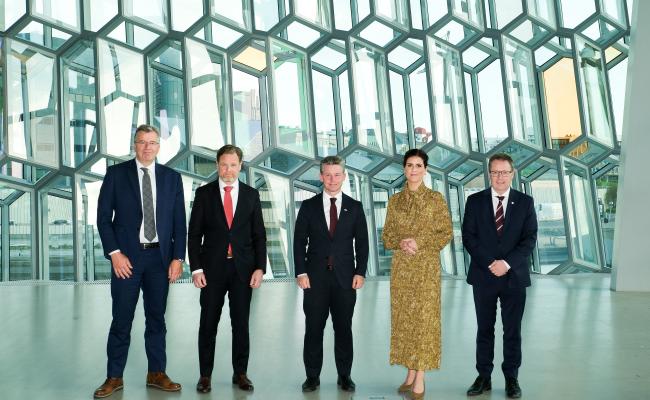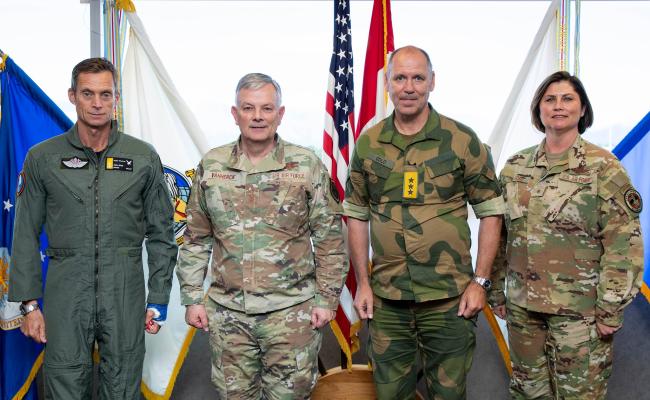Believes Norway’s Cautiousness Toward Russia to Be Outdated
Nato vs forskning: Stian Jenssen, stabssjef ved Natos generalsekretær kontor og seniorforsker Karsten Friis ved Norsk utenrikspolitisk institutt (NUPI) under debatten om Nato i regi av Den norske atlanterhavskomite under Arendalsuka. (Foto: Trine Jonassen)
Arendal (High North News): NUPI researcher Karsten Friis and former Army Chief Rune Jakobsen believe Norway must stop walking on eggshells around the Russian border. "Russia has shown its true self, and we should put aside this fear of provoking them," says Jacobsen. "Too soon," says the Conservative Party's defense policy spokesperson.
Before Norway joined the Atlantic Treaty and NATO, the Norwegian government declared that it would not enter into agreements that obliged Norway to open its bases for foreign forces on Norwegian soil as long as Norway was not attacked or exposed to threats of attack.
These self-imposed restrictions were seen as one of the pillars of Norwegian foreign and security policy toward Russia during the Cold War. The purpose was, among other things, to dampen the tension in the High North.
Now, some argue that the Norwegian reservation policy is outdated and that it does not work against an obviously aggressive Russia.
Does not follow Norway
The new Nordic NATO members Finland and soon Sweden, have not committed to follow Norway's cautiousness toward Russia.
The Swedish government has announced that they will address the issue of NATO bases when the membership is final, likely during the fall when the membership has been approved by Turkey. Finland is open to NATO bases being permanently placed in Finland and is not especially afraid to provoke its neighbor.
It is up to Sweden and Finland.
"Russia has been responsible for the escalation in the past years and months. If we stay within the limits of international law and a rule-based world order, we cannot see that it is a provocation," says the Finnish MFA Elina Valtonen to Aftenposten.
Does not make sense
During an Arendal Week debate hosted by the Norwegian Atlantic Committee, the Director of the Private Office of the NATO Secretary General said that NATO bases are up to each member country and that NATO does not lay down any directives on the matter.
"It is up to Sweden and Finland. NATO will not insist on bases there," says Director Stian Jenssen when questioned by High North News.
Senior Researcher Karsten Friis at the Norwegian Institute for International Affairs (NUPI) also participated in the debate and believes that Norway's Russia policy is outdated and must be updated.
"We now see British and American intelligence aircraft flying along the Finnish border with Russia that turn around when they come to Finnmark because they cannot fly over Norway. So something about our self-imposed restrictions are not making sense," believes Friis.
Generalløytnant (P) Rune Jakobsen, tidligere sjef Forsvarets operative hovedkvarter (FOH) og sjef Hæren under debatten om Nato på Arendalsuka. (Foto: Trine Jonassen)
NATO base in Finnmark?
"It is important to discuss base policy. Especially after (the war crimes, ed.note) in Bucha, when we have seen how Russia acts. Should we then be so scarcely defended in Finnmark? Perhaps we should have a NATO base in Finnmark or at least discuss the base policy?" asks Friis.
Ukraine is investigating almost 60 000 possible war crimes. It concerns everything from murder, kidnapping, random bombings to sexual assaults conducted by Russian soldiers.
Friis believes that we must take a look at Russia with new eyes and remind them about what the base policy was really about.
No invasion
"The point is not to provoke Russia. The point is to not give the former Soviet Union and now Russia a legitimate reason to believe that we are to attack them from Norway, due to the proximity of the Kola base," says the senior researcher.
Also read
"Of course, setting up missiles on the border with Russia, I understand that they would react. But having better land defense and better defense systems closer to the border is something else," says Karsten Friis, adding that no one will believe that Norway is to march in and occupy Russia.
"Therefore, I think the discussion about the defense in the north and the NATO bases is important. And having a NATO base in the north can be beneficial, where one has various flags on one's arm. It is an interesting discussion, but it is tabu in Norway. The base policy is quite sacred here."
Still predictable
"What happens if our neighbor missteps against Russia from a Norwegian perspective?"
"The High North is not like the rest of the NATO borders. We shall, of course, be cautious toward Russia because of the proximity to the strategic nuclear weapons on the Kola base. I do not think that we should make any radical changes. We will still be predictable. But we can have more military activity in a way that allows us to respond quickly if anything happens," says Friis.
And the reason why he thinks that this must be talked about in Norway is precisely Russia's brutal way of waging war, with murders and rape.
In 2007, military leaders said a future conflict in Europe was unimaginable.
"We would rather not see this in Kirkenes. And I think many countries share this way of thinking. For example, many NATO countries have strengthened their presence along the borders with Russia. That is not happening in Norway. What Russia's way of waging war means for our defense is a debate we have not embarked on."
Wrong choices
Lt. General Rune Jacobsen also participated in the debate as Former Chief of the Norwegian Joint Headquarters and the Norwegian Army and made some sharp statements against the choices made in the Norwegian defense sector in the past years.
Choices that appear less good in light of Norway bordering a country at war.
"In 2007, military leaders said that a future conflict in Europe was unimaginable. And that has been the guiding principle for how we have designed the structure of the Armed Forces today," says Jacobsen and lists:
"We have abolished an excellent submarine base in Tromsø, we have closed Europe's best fighter base in Bodø and moved the fighter planes to Ørlandet where we must have tank support to fly sensibly in a future war scenario. So we have have made some wrong choices."
Stian Jenssen is the Director of the Private Office of the NATO Secretary General and participated in the debate about NATO during the Arendal Week. (Photo: Trine Jonassen)
"And then there is the main problem for the Armed Forces, which is a consistent underfunding over the past 25 years, where the political goals for the Armed Forces are not reflected in the actual allocations," says Jacobsen.
A lack of crisis understanding
He stands behind previous statements pointing to a lack of understanding of the crisis in Norway, and he points out that the Nordstream pipeline had to explode before one realized that it was wise to secure installations physically.
In addition, the government has planned for Norway to fulfill NATO's goal that two percent of gross domestic product (GDP) should go to defense by 2026.
In Sweden, this target is set for 2024.
Historical change of pace
Stian Jenssen says that a change of pace has registered with NATO.
"Those who did not wake up when Russia invaded Crimea in 2014 definitely woke up in 2022. Germany has now discarded 75 years of security policy baggage, Sweden is getting rid of 200 years of neutrality, and Finland has taken the step into NATO. Historical things are happening now, also in Japan. And it is gratifying that the Norwegian defense has also come up with a plan to deliver on the two percent," says Jenssen, who prefers not to comment on allegations of a lack of understanding of the crisis on the part of Norway.
Also read
Rune Jacobsen points out that the reservation policy towards Russia has now done its job. Because when someone shows you who they are, you should believe them.
"The self-imposed restrictions against Russia have served us well all these years and have contributed to the fact that the Nordic region is still a low-tension area. But now that Russia has shown its true face, I think we should put aside this fear of provoking them," says the experienced Lt. General.
"The time is ripe for us to discard the base policy and the self-imposed restrictions and draw up a new Russia strategy – which does not necessarily have to look so different from the one we have – but it is important to work towards this now and send clear signals to Russia in the future."
Mainly to avoid a set of hybrid influence operations in an area where we are very vulnerable.
A clear red line
Stian Jenssen points out that it has been discussed whether it would be provocative to hold exercises too close to Russia's border.
Grey areas are dangerous and create fertile ground for misunderstandings.
But he believes that there is actually a presence, including in the Baltics, which draws a clear red line and which clearly signals to Moscow that this is a line that is not to be crossed.
Therefore, a clear and robust presence is important, and it also creates reassurance.
"Gray areas are dangerous and create fertile ground for misunderstandings. This is also the case in the Nordic areas. Norway has had the role of "NATO in the north", but the Arctic is more than just Norway. There is also Alaska, Greenland and Canada, and more. It encompasses much more than Norwegian territory. And other allies also have central interests in the area. So has NATO as a whole."
Not least from the USA's side, the presence in the High North is increasing strongly, precisely to create predictability and clarity through a strong military presence, Jenssen points out.
"And if Norway is to have ambitions in the long term to influence what this presence looks like, they must sweeten the deal more than today," concludes NATO's Stian Jenssen.
"We must not forget that the High North is a low-tension area, and we have not seen any military escalation in the High North as a result of the Ukraine conflict," says the Conservative PArty's defense policy spokesperson Hårek Elvenes. (Photo: Trine Jonassen)
Too soon
The Conservative Party's defense policy spokesperson Hårek Elvenes believes it is too early to talk about NATO bases in Norway.
"Simply put, the Norwegian Russia policy consists of the balance between deterrence and reassurance. And the amount between these two factors is not constant. So Rune Jacobsen is right that as the situation is now, deterrence must be emphasized more strongly than before," says Elvenes to High North News.
But going from there to establishing pure NATO bases on Norwegian soil, the Storting politician believes, is going too far.
"So I disagree with that. We just got the new agreement with the US to establish common areas on four different military bases. We train more closely with the Americans and store in advance," says Elvenes.
The military agreement with USA allows the US to make arrangements in certain Norwegian areas to modernize the infrastructure and possibly exclusive right of use - so-called agreed areas.
This applies to the airports at Rygge, Sola, Evenes, and Ramsund Naval Base.
"In my opinion, the time has not come to revise Norwegian base policy so radically that American bases are established on Norwegian soil. We must still not forget that the High North is a low-tension area, and we have not seen a military escalation in the Nordic region due to the Ukraine conflict," Elvenes points out, who is also part of the Foreign Affairs and Defense Committee.
However, he believes we must be careful not to be naive in our relationship with Russia.
"We must not ignore the possibility that it could happen, so yes, we must strengthen deterrence. But establishing American bases on Norwegian soil is not advisable," concludes Hårek Elvenes.
Also read
This article was originally published in Norwegian and has been translated by Birgitte Annie Molid Martinussen.




